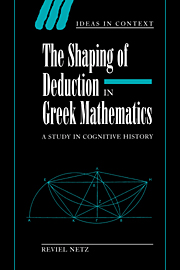Crossref Citations
This Book has been
cited by the following publications. This list is generated based on data provided by Crossref.
Netz, Reviel
1997.
Classical mathematics in the classical Mediterranean.
Mediterranean Historical Review,
Vol. 12,
Issue. 2,
p.
1.
Grattan-Guinness, Ivor
and
Griffiths, H. Brian
2000.
Book reviews.
Zentralblatt für Didaktik der Mathematik,
Vol. 32,
Issue. 1,
p.
25.
Stedall, Jacqueline A.
2001.
Of Our Own Nation: John Wallis's Account of Mathematical Learning in Medieval England.
Historia Mathematica,
Vol. 28,
Issue. 2,
p.
73.
Herreman, Alain
2001.
La mise en texte mathématique.
Méthodos,
Rubin, Richard L.
2001.
Theory and method in history of mathematics.
International Journal of Mathematical Education in Science and Technology,
Vol. 32,
Issue. 5,
p.
653.
Lloyd, G. E. R.
2001.
Is there a future for ancient science?.
Proceedings of the Cambridge Philological Society,
Vol. 47,
Issue. ,
p.
196.
Netz, Reviel
2001.
On the Aristotelian paragraph.
Proceedings of the Cambridge Philological Society,
Vol. 47,
Issue. ,
p.
211.
Netz, Reviel
2002.
Counter Culture: Towards a History of Greek Numeracy.
History of Science,
Vol. 40,
Issue. 3,
p.
321.
Christianidis, Jean
Dialetis, Dimitris
and
Gavroglu, Kostas
2002.
Having a Knack for the Non-Intuitive: Aristarchus's Heliocentrism through Archimedes's Geocentrism.
History of Science,
Vol. 40,
Issue. 2,
p.
147.
Betegh, Gábor
2002.
Qu'est-ce que la philosophie présocratique ?.
p.
381.
Zimmer, Nina
and
Holst, Bodil
2002.
Representations of electricity: the development of a visual language for electrical phenomena.
Interdisciplinary Science Reviews,
Vol. 27,
Issue. 4,
p.
257.
Lloyd, G.E.R.
2002.
Qu'est-ce que la philosophie présocratique ?.
p.
39.
Robson, Eleanor
2002.
Words and Pictures: New Light on Plimpton 322.
The American Mathematical Monthly,
Vol. 109,
Issue. 2,
p.
105.
Yunis, Harvey
2003.
Written Texts and the Rise of Literate Culture in Ancient Greece.
Corfield, David
2003.
Towards a Philosophy of Real Mathematics.
Waschkies, Hans-Joachim
2004.
Classics in the History of Greek Mathematics.
Vol. 240,
Issue. ,
p.
3.
Netz, Reviel
2004.
History of Science, History of Text.
Vol. 238,
Issue. ,
p.
161.
SOMFAI, ANNA
2004.
CALCIDIUS' COMMENTARY ON PLATO'S TIMAEUS AND ITS PLACE IN THE COMMENTARY TRADITION: THE CONCEPT OF ANALOGIA IN TEXT AND DIAGRAMS.
Bulletin of the Institute of Classical Studies,
Vol. 47,
Issue. Supplement_83_Part_1,
p.
203.
Seaford, Richard
2004.
Money and the Early Greek Mind.
Netz, Reviel
2004.
The Transformation of Mathematics in the Early Mediterranean World.





